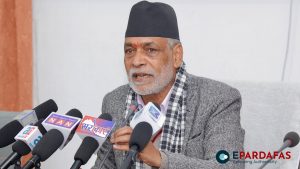
Nepal’s public debt exceeds Rs 2150 billion
Nepal’s public debt liability has exceeded Rs 2150 billion. According to the Public Debt Management Office, Nepal has been obliged to pay its public debt amounting over to Rs 2154 billion and 123.9 million, including Rs 1083 billion 473.9 million towards internal debt and Rs 1070 billion 649 million towards external debt as of 14 May 2023.
Nepal’s public debt liability was Rs 2013 billion 296.4 million until mid-July last year when the current fiscal year 2079/80 had begun.
Public debt amounting to Rs 140 billion 827.5 million was added to the country’s debt portfolio in the last 10 months of this fiscal year.
The ratio of public debt in GDP appeared to be 44.40 percent while considering Nepal’s Gross Domestic Production (GDP) as Rs 4851 billion 620 million.
The rise of public debt ratio in GDP and weak economic growth rate due to low capital formation could put the country’s economy in crisis in coming days.
According to the Public Debt Management Office, the government has raised public debt of Rs 230 billion 246.7 million in the first 10 months of the current fiscal year. Likewise, the government has paid principle and interest amounting to Rs 143 billion 420.2 million in the corresponding period.
As of May 14 this year, the government spending in the repayment of principle and interest of public debt exceeded the capital spending by around Rs 18 billion. The government has spent Rs 125 billion 670 million towards capitalized category up to May 14 this year.
On the one hand, the government’s capacity to raise public revenue was waning that pushed it for making deficit budget. On the other, big size of annual budget was being spent for the repayment of principle amount of the rising public debt amount.
- Over 1,000 Fire Incidents Reported in Five Months; 16 Lives Lost
- Earthquake Safety Day: A Call for Stronger Preparedness and Resilience
- Government Ordinance Driven by Necessity, Not Intention: Minister Prithvi Subba Gurung
- Dr. Shekhar Koirala Highlights Nepal-Britain Relations and Future Aspirations at British Parliament













Comments